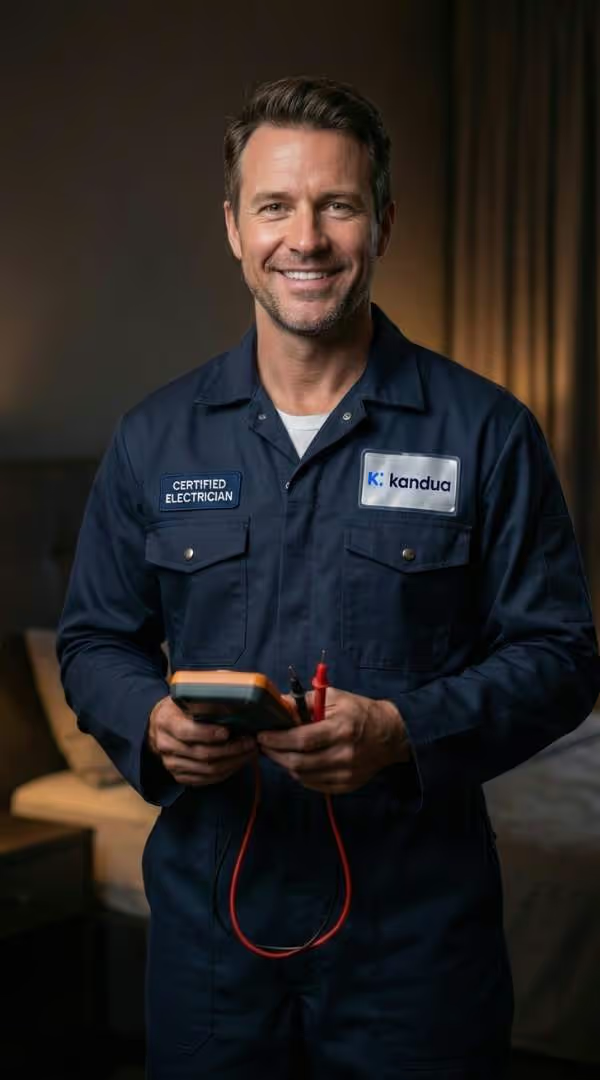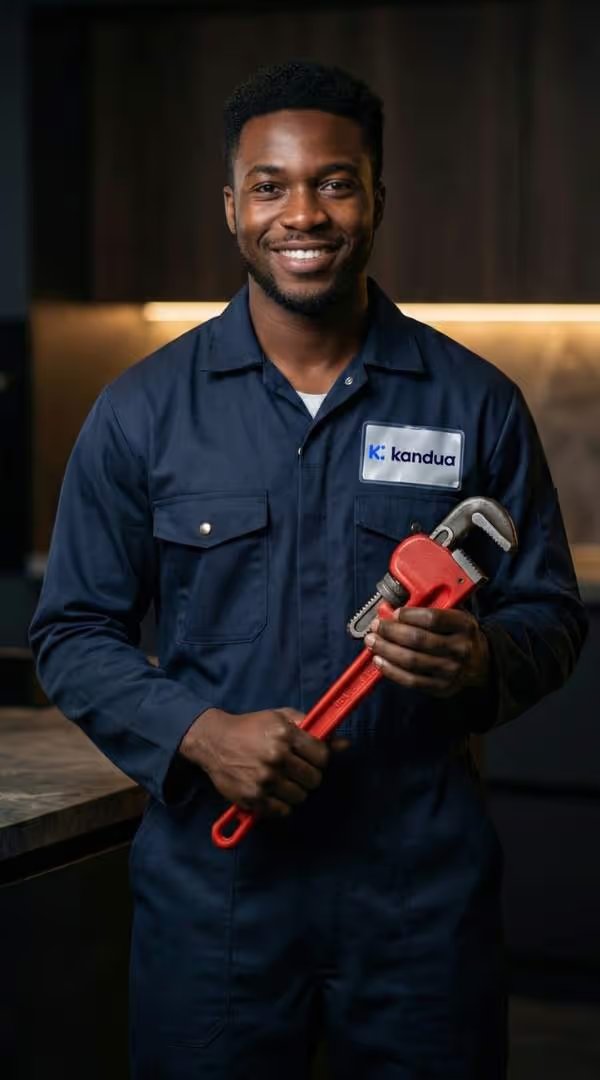Hidden Water Leak Detection Cost in South Africa: Non-Invasive Solutions
.webp)
Cost guide summary
Discover what hidden water leak detection really costs in South Africa – from acoustic and thermal imaging to tracer gas – and when it’s worth calling a non-invasive leak detection specialist to avoid massive water damage and repair bills.

A flat fee for coming to your location or onsite inspection to provide a quote, typically charged even if no work is done
An additional charge for urgent call-outs, typically outside of standard scheduling
Extra fee for work requested outside of normal business hours, including evenings, weekends, or public holidays
The typical cost of parts, supplies, or equipment used to complete the job, charged in addition to labour. Varies greatly based on job requirements
The average cost of labour per hour. Pros generally bill per hour for most jobs
A fee for site clean-up after the work is done, especially if the job creates debris, dust, or waste
A suspected hidden water leak can be stressful, but utilising non-invasive leak detection technology can pinpoint the problem accurately, saving you significant money on water bills and destructive exploratory work.
Hidden Water Leak Detection Cost in South Africa: Non-Invasive Solutions
Dealing with a hidden water leak can be a homeowner's nightmare, leading to high water bills and potential structural damage. Fortunately, modern, non-invasive leak detection methods allow specialists to find the source of the leak without tearing down walls or digging up your garden. This guide breaks down the costs associated with professional leak detection in South Africa, helping you make an informed decision.
Advice Before Hiring a Leak Detection Specialist
Before calling in a professional, a few preparatory steps can ensure a smoother and more cost-effective process:
- Check for Obvious Signs: Look for visible signs of water damage, such as damp spots, mould growth, peeling paint, or unusually green patches of grass in your garden. Note these down to show the specialist.
- Monitor Your Water Meter: If you suspect a leak, turn off all taps and water-using appliances. Check your water meter. If it's still running, you likely have a leak.
- Gather Information: Be ready to provide the specialist with as much information as possible. When did you first notice the issue? Have you had any recent plumbing work done? This context helps them narrow down the search area.
- Understand the Technology: Ask the specialist what type of equipment they use. Understanding whether it's acoustic, thermal, or gas tracing will help you appreciate the value and accuracy of the service you're paying for.
Typical Costs for Common Leak Detection Methods
The cost of leak detection is heavily influenced by the technology required to find the leak accurately without causing damage.
- Acoustic Leak Detection: Specialists use sensitive microphones to listen for the sound of water escaping from a pressurised pipe. This is ideal for finding leaks in pipes under floors and behind walls. The cost for this service typically ranges from R850 to R2,500.
- Thermal Imaging (Infrared) Detection: Thermal cameras detect temperature differences caused by water, making them excellent for finding hidden leaks from hot water pipes or moisture in wall cavities and ceilings. A thermal imaging survey often costs between R1,500 and R3,500.
- Tracer Gas Detection: For very difficult-to-find leaks, a safe, non-toxic gas (usually a hydrogen/nitrogen mix) is introduced into the drained pipe. The gas escapes at the leak point and is detected above ground by a sensitive probe. This highly accurate method typically costs between R2,000 and R4,500.
Regional Leak Detection Costs
The rates for leak detection specialists can differ based on your location in South Africa.
- Western Cape: Costs tend to be slightly higher, with a typical call-out and detection service ranging from R1,500 to R4,000.
- Johannesburg: You can expect to pay between R1,200 and R3,500 for a standard leak detection service.
- Pretoria: Prices are similar to Johannesburg, generally falling between R1,200 and R3,300.
- KwaZulu-Natal: The average cost for leak detection services ranges from R1,300 to R3,800.
Factors Influencing Leak Detection Costs
Several key factors will determine the final invoice for finding that hidden leak.
- Type of Technology Used: More advanced methods like tracer gas are more expensive than standard acoustic detection.
- Location and Accessibility of the Leak: A leak under a concrete slab is more complex and time-consuming to find than one in an accessible wall cavity.
- Number of Leaks: If you have multiple leaks, the time and complexity of the job will increase.
- Property Size: A larger property with extensive plumbing will take longer to inspect, increasing labour costs.
- Specialist's Expertise: Highly experienced specialists with advanced equipment may charge more, but their accuracy can save you money on unnecessary repairs.
- Urgency: An emergency call-out outside of normal working hours will incur additional fees.
Task Difficulty and Associated Costs
- Easy Jobs (e.g., confirming a suspected leak in an accessible wall):
- Duration: Typically 1–2 hours
- Cost: R850–R1,800 including the call-out fee and use of one detection method.
- Complex Jobs (e.g., locating a small leak under a foundation or in a complex pipe network):
- Duration: 3–5 hours or more
- Cost: R2,500–R5,000+, potentially requiring multiple detection technologies and extensive tracing.
Example Cost of a Typical Leak Detection Job
- Task: Leak Detection - Concealed Pipe (e.g., under a tiled floor)
- Labour & Equipment: A specialist using acoustic and thermal imaging equipment to pinpoint the leak. Approximately R1,800–R3,500.
- Additional Fees: This usually includes the call-out fee. No significant materials are typically used, but a tracer gas fee could apply if needed.
- Estimated Total: Approximately R2,000–R3,800. Note that this cost is for detection only and does not include the cost of accessing and repairing the pipe.
When to Hire a Professional Leak Detection Specialist
Investing in a professional is a wise choice when:
- Your water bill has spiked unexpectedly without a clear reason.
- You can hear the sound of running water when all taps are off.
- You see signs of damp, but cannot locate the source.
- You need to pinpoint a leak accurately before undertaking costly and destructive repair work like breaking concrete or tiles.
Hiring an expert is an investment against much higher costs associated with widespread water damage and speculative digging.
Tips to Save Money on Leak Detection
- Act Quickly: The longer you wait, the more water you lose and the more damage can occur. Addressing the problem promptly saves money.
- Provide Clear Access: Ensure the areas where you suspect the leak are accessible to the specialist to save them time.
- Get a Detailed Quote: Ask for a quote that outlines the call-out fee, hourly rate, and any potential costs for different technologies.
- Bundle the Repair: Some companies that offer leak detection also perform the repairs. Ask if there is a discounted rate for bundling the detection and repair services.
Frequently Asked Questions About Leak Detection in South Africa
Is the cost of leak detection covered by insurance?
Many home insurance policies in South Africa cover the cost of finding the leak (the 'trace and access' portion) but not always the cost of the repair itself. Check your policy details or speak to your broker.
Does the leak detection fee include the repair?
No, typically the quoted cost is only for locating the source of the leak. The repair is a separate job and will be quoted for separately once the problem has been identified.
How long does it take to find a water leak?
A straightforward leak can often be found within 1 to 2 hours. However, more complex issues, like those under foundations or within intricate pipe systems, can take several hours.
What happens if the specialist can't find the leak?
Reputable specialists have very high success rates. However, in the rare case a leak cannot be found, they may charge a reduced fee for the time and equipment used. It's important to clarify this policy before they begin work.
Why is non-invasive leak detection better than just digging?
Non-invasive methods are highly accurate and prevent unnecessary damage to your property. Blindly digging or breaking walls can lead to thousands of Rands in repair costs for flooring, tiling, and plastering, often without even finding the leak.
Can you detect leaks in irrigation or pool systems?
Yes, specialists use the same technologies (acoustic, gas, thermal) to find leaks in swimming pool plumbing and garden irrigation systems.
Will I receive a report after the detection?
Most professional companies will provide a detailed report of their findings, including photographic evidence and the precise location of the leak. This is often required for insurance claims.
Is the tracer gas used for leak detection safe for my family and pets?
Absolutely. The gas used is a harmless mixture of nitrogen and hydrogen, which is non-toxic, non-flammable, and dissipates quickly without leaving any residue.
Summary of Leak Detection Costs (2025)
- Budget Cost (Low-End): Approximately R850
- Average Cost: Approximately R2,200
- High-End Cost: Approximately R4,500
- Cost Range: R850–R5,000+
Brief Descriptions of Additional Leak Detection Costs
- Call-Out Fee: Typically R600–R950. This fee often covers the first hour of labour and the transport costs to get the specialist and their equipment to your property.
- Emergency Fee: Expect to pay an additional R800–R1,500 on top of the standard rates for urgent, same-day service.
- After-Hours Rate: For services required on evenings, weekends, or public holidays, an additional charge of R300–R600 per hour is common.
- Cleaning/Disposal Fee: This is generally not applicable for leak detection itself, as the process is non-invasive and creates no mess.
- Typical Materials Cost: Material costs are minimal, but if tracer gas is used, it may add R500–R1,000 to the bill, depending on the volume needed.
- Typical Labour Cost: Labour, which includes the specialist's expertise and use of advanced equipment, is the primary cost, typically ranging from R750 to R1,500 per hour after the initial call-out.
Related articles, advice and more
.webp)
What Does a Plumbing Call-Out Fee Usually Include?
When that familiar drip-drip-drip starts under the kitchen sink or your geyser begins a slow weep in the ceiling, the first thing most South African homeowners do is pick up the phone. But before a wrench even touches a pipe, you’ll likely hear the term "call-out fee."
.jpg)
How to Choose Between Repair and Replacement for Your Geyser
Deciding between repairing and replacing isn't just about the immediate price tag. It is about safety, long-term electricity savings, and compliance with South African building regulations. Based on insights from vetted plumbers across Johannesburg, Cape Town, and Durban, this guide will help you navigate that decision with confidence.
.jpg)
What to Do If Your Electric Problem Comes Back After Repair
There are few things more frustrating than paying for a repair only to have the lights flicker, the breaker trip, or the plug point fail again a few days later. Here is a step-by-step guide to handling the situation professionally, safely, and effectively to get it sorted out for good.
.jpg)
Understanding Geyser Warranties in South Africa
For most South African households, the geyser is the hardest-working appliance in the home. To help you protect your investment, we have broken down exactly how Geyser warranties work in South Africa, drawing on insights from qualified plumbers who handle rejected claims daily.
.webp)
How Hard Water Damages Your Plumbing (and What to Do About It)
If you suspect you have hard water, you are in the "awareness" stage of a very important journey for your home's maintenance. Ignoring it can lead to burst geysers and clogged pipes. This guide, compiled with insights from top local plumbers, will explain exactly how hard water affects your plumbing and the practical steps you can take to fix it.
.webp)
Beyond the Unboxing: A Detailed Guide to Correct Washing Machine Plumbing & Setup
New washing machine in South Africa? Learn essential plumbing and setup tips to prevent leaks, ensure efficient operation, and extend your appliance’s lifespan - expert advice before your first load.
.webp)
New Washing Machine? Don't Plug It In Yet! Essential Installation Tips for SA Homes
Installing a new washing machine? Learn the essential setup steps South African homeowners often overlook to prevent leaks, noise, and damage—and ensure efficient, long-lasting performance from day one.
.webp)
Septic Tank Leak Repair Cost in South Africa: Addressing Odours & Environmental Hazards
Learn typical septic tank leak repair costs in South Africa, what drives the price up, how to spot early warning signs (odours, soggy ground, backups), and when it’s safer and cheaper to get a professional in.
.webp)
Shower Repair Cost in South Africa: Leaks, Pressure Issues & Drain Problems
A leaking shower, low water pressure, or a blocked drain can disrupt your daily routine. This guide provides a detailed breakdown of shower repair costs in South Africa to help you budget effectively and get your shower back in working order.
How to Install a Horizontal Geyser | Step-by-Step Pro Guide
Want to install a geyser like a pro? This step-by-step tutorial shows you exactly how to do a horizontal Ariston Axios geyser installation, straight from the BluLever plumbing workshop. 🎥 Hosted by MK, BluLever’s technical facilitator, and supported by a qualified electrician, Life and a BluLever graduate artisan, Zinhle. This is your ultimate guide to a SANS 10254-compliant installation — from preparing the wall, to plumbing, electrical wiring, and pro troubleshooting tips.
How to Maintain a Geyser | Step-by-Step Pro Guide
Want to maintain a geyser like a pro? This step-by-step tutorial shows you exactly how to do the three core geyser maintenance checks on an Ariston Axios geyser installation, straight from the BluLever plumbing workshop. 🎥 Hosted by MK, BluLever’s technical facilitator, and supported by a qualified electrician, Life. This is your ultimate guide to geyser maintenance — from diagnosing the problem to checking the heat regulation of the geyser, to pressure regulation and then finally corrosion protection.
Latest articles, advice and more
.webp)
How to Check If an Electrician Is Registered with ECB
The Electrical Conformance Board of South Africa (ECB) serves as a vital gatekeeper in this industry. If you are in the middle of a renovation or just need a new DB board installed, knowing how to verify your electrician’s registration is the most important step you can take.
.webp)
What Does a Plumbing Call-Out Fee Usually Include?
When that familiar drip-drip-drip starts under the kitchen sink or your geyser begins a slow weep in the ceiling, the first thing most South African homeowners do is pick up the phone. But before a wrench even touches a pipe, you’ll likely hear the term "call-out fee."
.jpg)
How to Choose Between Repair and Replacement for Your Geyser
Deciding between repairing and replacing isn't just about the immediate price tag. It is about safety, long-term electricity savings, and compliance with South African building regulations. Based on insights from vetted plumbers across Johannesburg, Cape Town, and Durban, this guide will help you navigate that decision with confidence.
.webp)
Beyond the Unboxing: A Detailed Guide to Correct Washing Machine Plumbing & Setup
New washing machine in South Africa? Learn essential plumbing and setup tips to prevent leaks, ensure efficient operation, and extend your appliance’s lifespan - expert advice before your first load.
.webp)
New Washing Machine? Don't Plug It In Yet! Essential Installation Tips for SA Homes
Installing a new washing machine? Learn the essential setup steps South African homeowners often overlook to prevent leaks, noise, and damage—and ensure efficient, long-lasting performance from day one.
.webp)
TV Repair Costs in South Africa: Diagnosing Screen, Power & Component Issues
Find out what TV repairs really cost in South Africa – from call-out and diagnosis fees to screen, power and main board fixes – and when it’s cheaper to replace your TV instead of repairing it.
.webp)
Septic Tank Leak Repair Cost in South Africa: Addressing Odours & Environmental Hazards
Learn typical septic tank leak repair costs in South Africa, what drives the price up, how to spot early warning signs (odours, soggy ground, backups), and when it’s safer and cheaper to get a professional in.
.webp)
Hidden Water Leak Detection Cost in South Africa: Non-Invasive Solutions
Discover what hidden water leak detection really costs in South Africa – from acoustic and thermal imaging to tracer gas – and when it’s worth calling a non-invasive leak detection specialist to avoid massive water damage and repair bills.
How to Install a Horizontal Geyser | Step-by-Step Pro Guide
Want to install a geyser like a pro? This step-by-step tutorial shows you exactly how to do a horizontal Ariston Axios geyser installation, straight from the BluLever plumbing workshop. 🎥 Hosted by MK, BluLever’s technical facilitator, and supported by a qualified electrician, Life and a BluLever graduate artisan, Zinhle. This is your ultimate guide to a SANS 10254-compliant installation — from preparing the wall, to plumbing, electrical wiring, and pro troubleshooting tips.
How to Maintain a Geyser | Step-by-Step Pro Guide
Want to maintain a geyser like a pro? This step-by-step tutorial shows you exactly how to do the three core geyser maintenance checks on an Ariston Axios geyser installation, straight from the BluLever plumbing workshop. 🎥 Hosted by MK, BluLever’s technical facilitator, and supported by a qualified electrician, Life. This is your ultimate guide to geyser maintenance — from diagnosing the problem to checking the heat regulation of the geyser, to pressure regulation and then finally corrosion protection.

Not just another newsletter. It's an advantage
The Certainty Club is for homeowners who want certainty, not guesswork. Get the first look at real price benchmarks, compliance tips, maintenance advice, and new service launches.

Connecting you to qualified, trusted Pros.
The world’s first AI-powered home services platform, here to help you protect, maintain, and improve your home with confidence.

.avif)
.webp)
.webp)



.svg)
.svg)